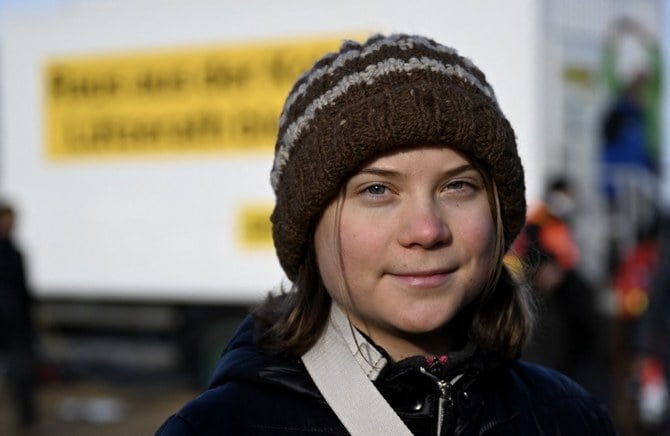
Some girls dream of being a pop star or, in the modern world of social media, an influencer on Instagram or TikTok. Others dream of having an impact on humanity, society and the world. There is one story that falls into the latter category — a young woman, different in many ways but also extraordinary, whose seemingly sudden impact may transform the face of traditional leadership.
In 2018, aged just 15, climate activist Greta Thunberg protested outside the Swedish Parliament with a sign that translated as “School Strike for Climate.” Within a year, she had been named “Person of the Year” by Time magazine. Also in 2019, she met with world leaders such as UN Secretary-General Antonio Guterres, Austrian President Alexander Van der Bellen and former California Gov. Arnold Schwarzenegger.
Her passion remains undimmed. This week, she was on the front line with thousands of others in Germany protesting against a plan to tear down the village of Luetzerath to make way for the expansion of a coal mine, calling it “one of the biggest carbon bombs in Europe.” She was even pictured being detained by police, although she was soon released.
To what extent can we speak of a “Greta effect,” as — through her example — she shows how today’s young women and youth can be heard in debates on the climate crisis? How have her successes and controversies affected approaches to activism and our understanding of leadership?
Thunberg’s popularity is not simply present in newspapers, but is also seen in the growing amount of research that aims to understand the so-called Greta effect. For example, a report co-written by Anandita Sabherwal and published in the Journal of Applied Social Psychology used cross-sectional data from a survey of US adults to investigate whether exposure to Thunberg can be useful for predicting whether collective action will be effective, and the likelihood of intentions toward activism being acted upon.
It is not just what she says or how she says it, but who she is perceived to be that makes the Greta effect both challenging and effective
Dr. Diana Galeeva
The research found that support for Thunberg’s climate activism is frequently noted in those who are familiar with her as a person or her media presence. Belief in collective efficacy and collective action intentions were higher among this group. An indirect effect of familiarity with her via collective efficacy is demonstrated among all age groups, with a larger alignment with liberal (rather than conservative) political views. The research also suggests that young public figures like Thunberg might motivate collective action across the US, although again general political ideology may be a highly influential factor.
Also interesting in this regard is research published in 2021 by Elisa Iacomini and Pierluigi Vellucci, who considered a polarizing effect in opinion around the climate crisis linked to the “Greta Thunberg phenomenon.” They developed an opinion dynamics model measuring different types of contrarian agents.
Considering these papers and other research, questions remain about how the Greta effect plays out in different contexts, considering the age, gender and political views of different groups.
Further research — Leann Leung’s 2020 thesis — has applied a critical discourse analysis framework to study Thunberg’s rhetorical and discursive methods. Perhaps the key to her effectiveness, particularly with younger audiences, is the forceful way she is able to frame her identity as being about activism, ideology and youth. Among the most important findings is the resilience of her rhetoric, which has consistently withstood the challenges of traditional hierarchies in family and society. She has not been co-opted into the existing discourse.
Also, the oppositional status of young people in the climate movement is harnessed not as a shortcoming but as a counterpower, challenging rather than accommodating the dominant narrative. She has the ability to counter existing dominant powers precisely by offering a new model of impact through age, modes of expression, gender and political views.
This is not to say that her intense fame is wholly positive or straightforward, with recognition of her name also registering with opposed voices, especially online. For example, research by Chang Sup Park, Qian Liu and Barbara Kaye in 2021 analyzed 3,300 user comments from the 11 most-viewed YouTube videos about Thunberg and found that an average of four out of every 10 comments contained some form of incivility. About 40 percent of such comments concerned her age, slightly more than a third were sexist and almost a quarter ableist. Often, the comments were directly derogatory rather than engaging on the topic of climate change — in other words, they were part of the Greta effect.
Similarly, Jieun Jung and colleagues, in their paper “When a Girl Awakened the World: A User and Social Message Analysis of Greta Thunberg,” analyzed the role of social media in Thunberg’s rise to celebrity by studying Twitter content and user profiles over 14 months. The research found that public figures and celebrities played a crucial role in strengthening her impact. Furthermore, some negative views about Thunberg were at least as closely linked to politically conservative views on age and gender as they were to skepticism about climate change. It is not just what she says or how she says it, but who she is perceived to be that makes the Greta effect both challenging and effective.
Thunberg is different from the classic images of leadership, such as the feared and pragmatic “The Prince” of Niccolo Machiavelli or Robert Dahl’s analysis of leaders as “a controlling group.” She brings into question the elitist and institutional assumptions of what makes leadership possible. Her example shows that the traditional faces of power — which are associated with what can be called primary power — can be challenged by contrasting elements, even where these are often considered signs of weakness, such as youth and femaleness.
Nontraditional security threats, in this case climate change, can be specifically addressed by nontraditional leaders, especially where these individuals can show the failure of traditional solutions and offer different, more dynamic perspectives. The Greta effect is a diverse and divisive force, perhaps one that is especially suited to unprecedented global changes. It remains to be seen how this challenge to traditional power can be harnessed and continued by other groups and individuals, especially those outside the traditional positions of power.
Dr. Diana Galeeva was an academic visitor to St. Antony’s College, Oxford University (2019-2022). She is the author of two books: “Qatar: The Practice of Rented Power” (Routledge, 2022) and “Russia and the GCC: The Case of Tatarstan’s Paradiplomacy” (I.B. Tauris/Bloomsbury, 2023). She is also a co-editor of the collection “Post-Brexit Europe and UK: Policy Challenges Towards Iran and the GCC States” (Palgrave Macmillan, 2021). Twitter: @diana_galeeva












